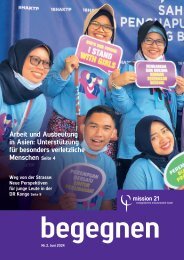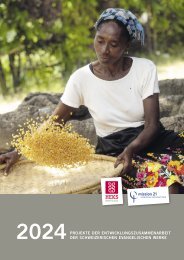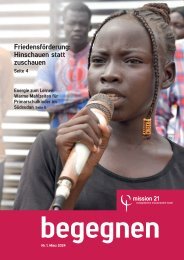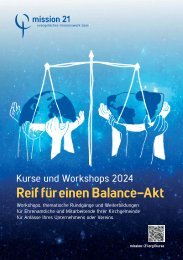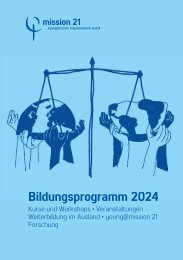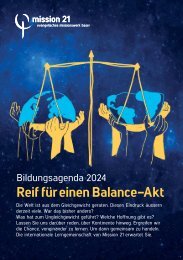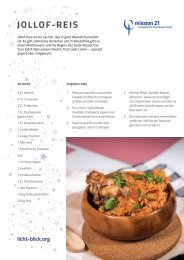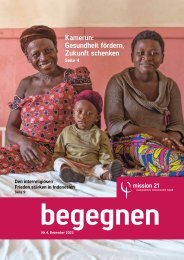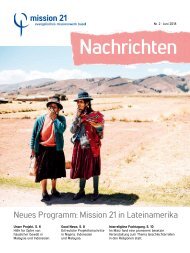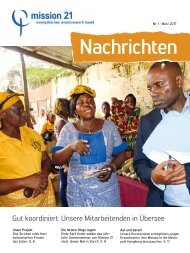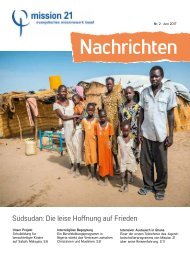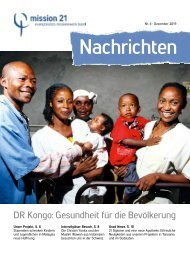Annual Report 2019
Annual Report 2019
Annual Report 2019
Create successful ePaper yourself
Turn your PDF publications into a flip-book with our unique Google optimized e-Paper software.
International Relations<br />
Taking action against domestic violence is a<br />
critical factor in bringing about fair and peaceful<br />
societies<br />
The Durebang Women's Home in Bandung is a good example<br />
of these vital efforts to combat domestic violence.<br />
In <strong>2019</strong>, 106 women who were victims of domestic violence<br />
found accommodation or support here. At a series<br />
of workshops (sometimes lasting several days), about<br />
130 women affected by gender-based violence became<br />
more aware of the issues involved thanks to education<br />
on this subject.<br />
Mission 21's commitment to fairer, peaceful societies<br />
also includes a project in Hong Kong, where we collaborate<br />
actively with our partner organisation to achieve<br />
social justice for female migrants. Interfaith peace work<br />
in Nigeria is another example: here, the aim of our work<br />
is for Christian and Muslim groups of the population<br />
to coexist in peace.<br />
Indah* and her son Arfi* found protection and<br />
advice in the Durebang Women's Home Center in<br />
the Indonesian city of Bandung.<br />
Photograph: Miriam Glass, Mission 21<br />
Indonesia<br />
Helping individuals –<br />
impacting everyone<br />
Our partners in Indonesia support women who are exposed to violence.<br />
This work has an impact on the lives of individual people – but it also has a much<br />
broader effect: efforts to combat sexual and domestic violence and suppress<br />
human trafficking contribute to a more peaceful society. In Indonesia, an interfaith<br />
network is working hard to achieve this goal.<br />
* Names changed<br />
In Indonesia, they’re called “the survivors”:<br />
women who have gone abroad to work and then<br />
return home. They are still alive – but they often<br />
come back with stories of abuse and exploitation.<br />
Indah* is one of them. She has been living<br />
back in Indonesia for the last few months after<br />
working in neighbouring Malaysia for ten years.<br />
As she talks about her time there, she keeps on<br />
covering her eyes with her hand. By her side, her<br />
nine-year-old son Arfi* is romping about and<br />
tugging at her clothes.<br />
Indah left her village on the island of Java to<br />
escape from the oppressive poverty there. She<br />
hardly knew where the next meal was coming<br />
from; education or a regular job were simply<br />
pipe dreams. When one of her friends told her<br />
about jobs in Malaysia, Indah put in her application.<br />
An agency told her that her documents<br />
would all be sorted out. But Indah had barely<br />
started her journey when her passport “got lost”.<br />
Nevertheless, she was taken over the border –<br />
and from then on, she worked in Malaysia as an<br />
illegal migrant.<br />
It wasn’t only Indah’s passport that went<br />
missing: she also lost two children who were<br />
born in Malaysia after Arfi. She and the children<br />
were the victims of human traffickers who not<br />
only organised work for Indah but also arranged<br />
12







